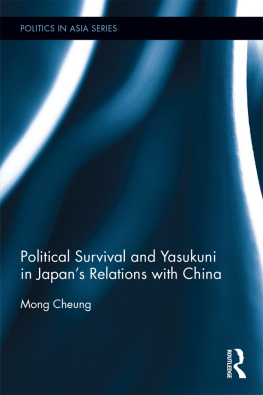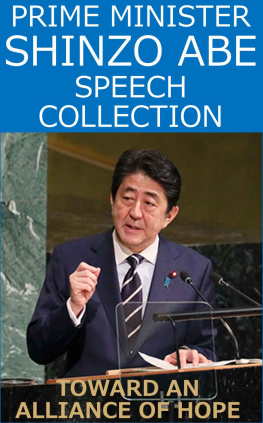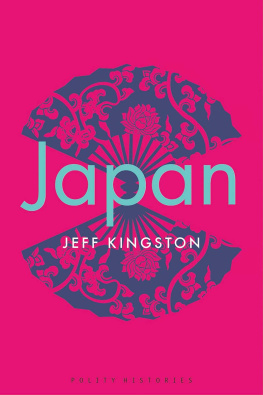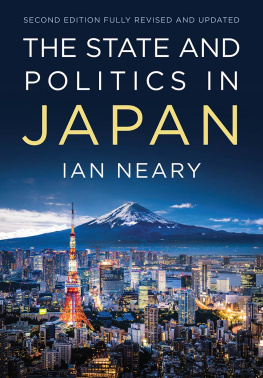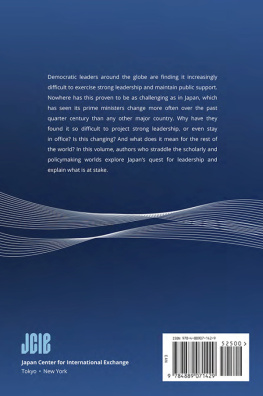Harris has written the best guide yet to Japans subtle but important political shift towards the new conservativesits origins, meaning, limitations and failuresof which the countrys longest-serving prime minister, Abe, is the prime exponent.
Bill Emmott, editor of The Economist, 19932006, chairman of the Japan Society of the UK, and author of Japans Far More Female Future
Throughout a period of tumult, both international and domestic, Abe has remained a grimly determined steady hand, a conservative force in a world of radical uncertainty. In translucent prose, Tobias Harris is a subtle commentator on Japan and a remarkably sure-footed guide to the inner workings of its longest-serving prime minister in history.
David Pilling, Financial Times, author of Bending Adversity: Japan and the Art of Survival
Harris has very skilfully told one of the great political comeback stories of our erathe fall and rise of not just Abe, but Japan itself. With colourful anecdotes and insightful analysis, the author shows us how Abe, a political blue-blood, pulled off the most remarkable second act in modern Japanese history by being an iconoclast. Harris tells how Abe challenged taboos and broke the mould to help Japan reclaim its confidence, and its rightful place in the world.
Martin Fackler, former Tokyo bureau chief, The New York Times
A superb biography of Abe, as well as a remarkably detailed political history of Japan, from Abes grandfather Prime Minister Kishi Nobusuke (195760) to Prime Minister Abe. Thoroughly researched, lucidly written. A great achievement.
Ezra Vogel, Henry Ford II Professor of the Social Sciences Emeritus, Harvard University
No political figure looms larger in Japans bid for national renaissance than the countrys longest-serving prime minister, Abe Shinz. In The Iconoclast Tobias Harris offers a nuanced depiction of the many shades of Abefrom conservative cultural warrior to champion of globalizationand his uneven domestic and international legacy. In telling the story of one man, Harris captures the little appreciated pulses of change redefining Japan.
Mireya Solis, Director, Center for East Asia Policy Studies, The Brookings Institution
The Iconoclast is a well-written and comprehensive chronicle of the politics and policies of Japans longest-serving prime minister.
Gerald L. Curtis, Burgess Professor Emeritus of Political Science, Columbia University
Tobias Harriss timely biography expertly uncovers the complex interplay between Abes pragmatism and nationalism at a pivotal moment for Japan in the changing international relations of East Asia. Judiciously blending a wealth of Japanese and English-language sources, Harris paints a portrait of Abe that combines historical drama, indispensable analysis of Japans postwar politics and a brilliant dissection of the strategic ambitions and policy achievements of this most influential of prime ministers.
John Nilsson-Wright, Senior Lecturer, Japanese Politics & IR, University of Cambridge, and Senior Research Fellow for Northeast Asia, Chatham House
Harris delivers a gripping chronicle of the rise, fall, and rise again of Abe Shinz, a young politician uniquely burdened by history. Crafting Abenomics, rebuilding the military, adroitly managing China and the US, Abe rightfully boasted that I am back, and so is Japan. The Iconoclast is an instant classic of Japanese politics and a must-read to understand how Americas most important ally has been transformed by its most skilful prime minister.
James Shinn, Senior Advisor, US Department of State
In this crisp, readable and studiously fair biography of one of the worlds most underestimated leaders, Abe, Tobias Harris manages to bring to life Japans complex postwar politics, and the struggle to keep the countrys economic edge and nurture a new nationalism in an increasingly combustible region.
Richard McGregor, Senior Fellow at the Lowy Institute, Sydney, and author of The Party and Asias Reckoning
A compelling portrait of Japans longest-serving prime minister, tracing both the world that shaped him and his place in history. The Iconoclast faces head-on the controversies that have marked Abes career and his determination to strengthen Japans geostrategic role and settle the countrys culture war. Tobias Harris is one of the most knowledgeable observers of Japanese politics, and his mastery of the subject is visible on every page.
Yoichi Funabashi, Chairman, Asia Pacific Initiative, former editor-in-chief, Asahi Shimbun
Much anticipated political biography of a consequential politician by an astute Japan watcher. A vivid portrayal of the rise and the fall, and the resurrection of an unexpected global statesman. Harris has done a superb job in helping us understand who Abe Shinz is and where he came from. His depiction of Abe is nuanced, reliable and engaging.
Toshihiro Nakayama, Professor, Keio University
At a time when Japans security environment deteriorates amidst Chinas aggressive military behaviour and North Koreas nuclear development, Prime Minister Abe Shinz has sought to secure Japan by upholding the international order alongside the US and other liberal democracies. Tobias Harris successfully examines Abes strategic vision with compelling insight into how his thinking evolved throughout his life.
Yoso Furumoto, Washington Bureau Chief, Mainichi Shimbun
THE ICONOCLAST
TOBIAS S. HARRIS
The Iconoclast
Shinz Abe and the New Japan

HURST & COMPANY, LONDON
First published in the United Kingdom in 2020 by
C. Hurst & Co. (Publishers) Ltd.,
41 Great Russell Street, London, WC1B 3PL
Tobias S. Harris, 2020
All rights reserved.
Printed in the United Kingdom
Distributed in the United States, Canada and Latin America by Oxford University Press, 198 Madison Avenue, New York, NY 10016, United States of America.
The right of Tobias S. Harris to be identified as the author of this publication is asserted by him in accordance with the Copyright, Designs and Patents Act, 1988.
A Cataloguing-in-Publication data record for this book is available from the British Library.
ISBN: 9781787383104
ISBN: 9781787385122 (e-book)
This book is printed using paper from registered sustainable and managed sources.
www.hurstpublishers.com
To Nathan and Caleb
May books bring you as much pleasure as they have brought me
&
To Jennifer
For everything
Politics is a strong and slow boring of hard boards.
Max Weber
Japans regulatory regime is like solid bedrock. I myself intend to serve as the drill bit that will break through that bedrock.
Abe Shinz
CONTENTS
Throughout this book its subject is referred to as Abe Shinz, using the correct word order in Japanese. However on the cover of The Iconoclast the publisher chose to refer to him as Shinz Abe, to avoid bibliographic, cataloguing and search engine confusion.
Despite a lifetime of reading books, when I embarked on this project, I honestly did not appreciate the extent to which producing a book is truly a collective enterprise. I received so much help in so many ways from so many people that it would be impossible to acknowledge everyonebut I will try.
First, I have to thank Kevin Kajiwara and Wolfgango Piccoli, co-presidents of Teneo Intelligence, where I have been the Japan analyst since 2013. When I told Kevin and Wolf that I was working on this book, they did not hesitate to give their support. In a larger sense, this book would not have been possible without Teneo, which gave me an excellent perch from which to analyze Abes return to power and the intellectual freedom to explore all facets of Japans politics during the second Abe administration. Declan Kelly, Paul Keary, and Doug Band have created a special company that genuinely appreciates and rewards intellectual achievement, and I am fortunate to have been part of it. Other Teneo colleaguesOrson Porter, Thomas Schoenfelder, Antonio Barroso, Alexandra Rogan, Bob Herrera-Lim, Gabriel Wildau, Otilia Dhand, Anne Fruhauf, Carsten Nickel, Nicholas Watson, Meghan McDonoughhave been sources of encouragement and insight before and during the process of writing this book. By generously sharing his insight into the Korean Peninsula, Victor Cha has expanded my understanding of Japans regional environment and it has been a privilege to work with him. I am also grateful to Jim Shinn, who, though no longer with Teneo, helped bring me to the company and has been a constant supporter, especially during the writing of this book.


